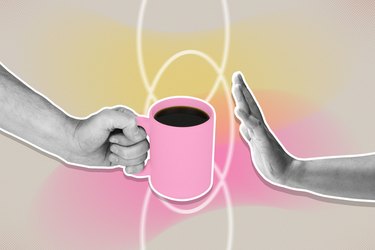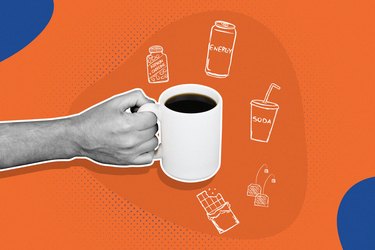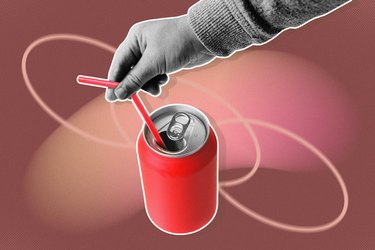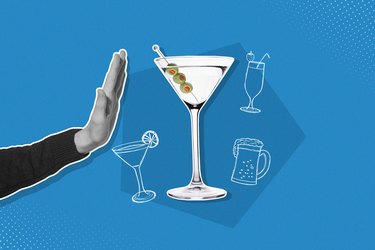
If your main motivation for getting out of bed is a steaming cup of coffee, we're with you. In fact, 85 percent of Americans drink at least one caffeinated beverage every day, per January 2014 research in Food and Chemical Toxicology.
But just how healthy is caffeine? And is all caffeine created equal? Not exactly.
Video of the Day
Video of the Day
"Caffeine has been shown to provide some amazing health benefits, such as prevention of Alzheimer's and heart disease, but the source of the caffeine is critical," says Annamaria Louloudis, RD, a registered dietitian at the virtual private practice Culina Health.
"Coffee contains caffeine along with antioxidants and other active substances that may reduce inflammation and help prevent chronic disease. Soda, on the other hand, contains caffeine but it also delivers added sugars that outweigh the benefits of the caffeine."
Read on to learn what really happens to your body when you break up with the stimulant.
Who Might Benefit From Going Caffeine-Free?
Not everyone needs to quit caffeine, but there's no doubt some people may feel better living a less caffeinated life.
"Caffeine may cause an increase in blood pressure, so people with hypertension should consider limiting their caffeine intake," Louloudis says.
"For those with gastroesophageal reflux disease (GERD), caffeine may trigger symptoms because it relaxes the lower esophageal sphincter, causing the reflux of stomach acid into the esophagus." That's why coffee, tea and soda — all caffeinated beverages — have been associated with an increased risk of GERD symptoms.
Anyone with sleep struggles or anxiety may also benefit from minimizing their caffeine intake. "Caffeine consumption within six hours of bedtime has been associated with disruptive effects on sleep and increased insomnia," Louloudis says.
You May Have Caffeine Withdrawal Symptoms
If you've ever skipped your usual cup of coffee and felt foggy, you're already familiar with this phenomenon. Coffee stimulates the central nervous system, so its sudden disappearance can send the mind and body into a frenzy.
In fact, caffeine withdrawal can be so severe that the fifth edition of Diagnostic and Statistical Manual of Mental Disorders (DSM-5) even included it as a diagnosis, per September 2014 research in Current Addiction Reports. The primary signs and symptoms of caffeine withdrawal:
- Headaches
- Intense fatigue
- Low mood and irritability
- Trouble focusing
- Flu-like symptoms
Not surprisingly, the more caffeine you're accustomed to drinking, the more severe your withdrawal symptoms are likely to be, per the Cleveland Clinic. Symptoms can show up anywhere from 12 to 24 hours after you last drank caffeine and may last up to nine days.
How Much Is Too Much Caffeine?
About 400 milligrams of caffeine — which equates to around four cups of coffee or 10 cans of soda — per day is safe for most adults, according to the Mayo Clinic. Of course, absolutely no one is recommending you drink 10 cans of cola daily...
It's recommended that pregnant people stick to less than 200 milligrams of caffeine per day for healthy fetal development. Also good to know: Caffeine can interact with medications like decongestants, so it’s important to talk to your doctor about your caffeine intake if you’re taking certain drugs.
You Could Lose Weight
If your daily caffeine fix looks like a liter of Coke or a venti peppermint mocha, you'll probably shed a few pounds if you cut caffeine from your diet.
Just one grande Salted Caramel Mocha from Starbucks serves up 470 calories and 59 grams of sugar. That's more added sugar than the average person should get over two whole days. It's not surprising then that swapping sugary drinks for decaf alternatives, like unsweetened herbal tea, is likely to bring weight loss.
But if you're already drinking black coffee or tea without sugar, you're unlikely to lose weight from cutting these drinks out.
Tip
No matter the type of caffeine you’re cutting out, be sure to go slow. Nixing caffeine cold turkey worsens withdrawal symptoms.
If you plan to reduce your caffeine intake, start cutting back by half a cup per day or swapping one regular coffee for decaf, Louloudis recommends. Gradually reducing your intake over two to three weeks is the best way to minimize withdrawal symptoms (and the temptation to caffeinate for relief), per the Cleveland Clinic.
You Might Feel Less Anxious
Caffeine is a central nervous system stimulant, meaning it can ramp up brain activity and fuel anxiety.
"A high caffeine intake can cause heart palpitations, trembling, headaches and insomnia in some people," Louloudis explains. "Since individuals who already live with anxiety are particularly prone to these symptoms, caffeine can worsen existing anxiety."
Caffeine has also been linked to feelings of panic, increased nervousness and psychological distress in some people, per an April 2020 study in Foods. If you live with anxiety, consider slowly dialing back your caffeine intake to see if it helps bring you more calm.
You’ll Probably Sleep Better
Caffeine acts as an adenosine-receptor antagonist, per a December 2018 study in Risk Management and Healthcare Policy. Adenosine is a chemical that builds up in the central nervous system over the course of the day and ultimately brings on feelings of drowsiness come nighttime.
When caffeine binds with adenosine receptors, it blocks the effects of the calm-bringing neurochemical, according to McGill University. The result: You feel extra alert.
Of course, everyone's caffeine tolerance is different. But for some people, called "slow metabolizers," that feeling of alertness can last hours. Even one cup of coffee at noon can cause serious sleep struggles when it's time to hit the hay.
The bottom line: If you're sensitive to caffeine, quitting the stimulant may bring you better zzzs. Just don't be surprised if you feel less productive during the day, as caffeine also increases the production of energizing neurotransmitters like adrenaline. You win some, you lose some.
Your Digestion May Improve
Caffeine speeds up the motility of the GI tract, so individuals who struggle with conditions like diarrhea-predominant irritable bowel syndrome (IBS) may experience relief from cutting out caffeine, Louloudis says.
You'll remember that minimizing caffeine intake by cutting out common triggers like coffee, tea and chocolate can also improve GERD symptoms. Removing caffeinated, carbonated beverages (like soda) from the diet can also improve gas and bloating for some people.
The Bottom Line
While not everyone needs to quit caffeine, some people (especially those who struggle with hypertension, GERD, IBS, anxiety or insomnia) may benefit from drinking less coffee, tea, energy drinks and soda.
Talk to your doctor or registered dietitian about how to steadily and safely curb your caffeine habit.
- Food and Chemical Toxicology: “Beverage Caffeine Intakes in the U.S.”
- Current Addiction Reports: ”Caffeine Use Disorder: A Review of the Evidence and Future Implications”
- Foods: “Intake of Caffeine and Its Association with Physical and Mental Health Status among University Students in Bahrain”
- Mayo Clinic: “Caffeine: How Much Is Too Much?”
- Cleveland Clinic: “Caffeine: How to Hack It and How to Quit It”
- Risk Management and Healthcare Policy: “Effects of Caffeine on Sleep Quality and Daytime Functioning”
- McGill University: “How Drugs Affect Neurotransmitters”
- Starbucks: “Salted Caramel Mocha”



